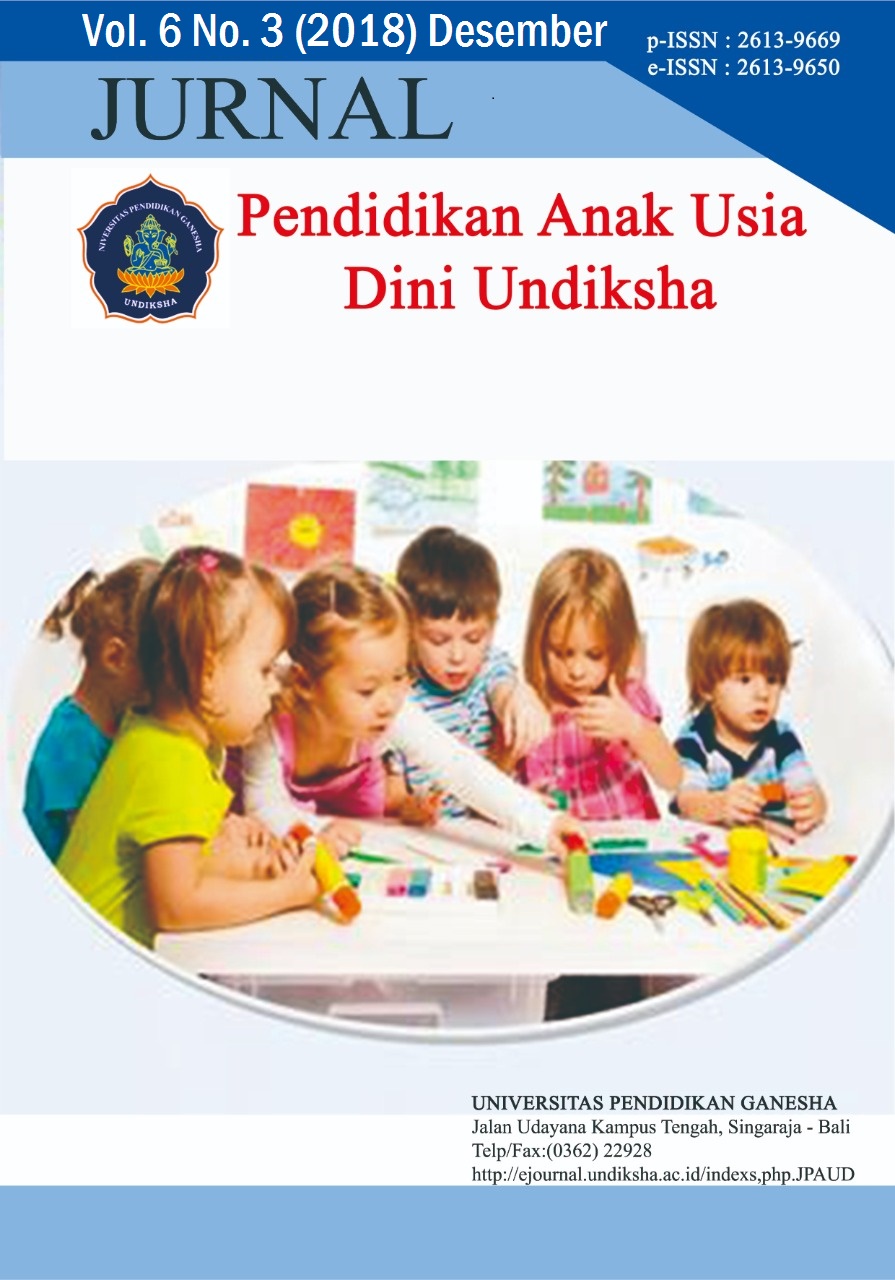PENGARUH PERMAINAN ULAR TANGGA "BUDI PEKERTI DAN KEBIASAAN BAIK" TERHADAP KARAKTER ANAK PADA TAMAN KANAK-KANAK
DOI:
https://doi.org/10.23887/paud.v6i1.15187Abstract
Penelitian ini bertujuan untuk mengetahui perbedaan karakter anak antara anak yang diberikan pembelajaran menggunakan permainan ular tangga “Budi Pekerti dan Kebiasaan Baik” dengan anak yang diberikan pembelajaran melalui metode ceramah. Jenis penelitian ini adalah penelitian quasi experiment dengan rancangan non equivalent control group design. Populasi penelitian adalah anak kelompok B di Taman Kanak-Kanak Gugus VI Singaraja Tahun Pelajaran 2017/2018 yang berjumlah 387 orang. Sampel penelitian ini dipilih dengan teknik cluster random sampling. Data penelitian tentang karakter anak dikumpulkan dengan metode observasi. Data yang dikumpulkan adalah data mengenai karakter anak yang dianalisis menggunakan metode analisis statistik deskriptif dan statistik inferensial dengan uji-t. bedasarkan hasil analisis di peroleh thitung= 2.742 pada taraf Sig 0,05 dengan dk 40 diperoleh nilai ttebel= 2.021. Berdasarkan kriteria pengujian, maka H0 ditolak, ini berarti hipotesis H1 diterima yang menyatakan terdapat perbedaan karakter anak antara anak yang diberikan pembelajaran menggunakan permainan ular tangga “Budi Pekerti dan Kebiasaan Baik” dan anak yang diberikan pembelajaran tanpa melalui permainan ular tangga “Budi Pekerti dan Kebiasaan Baik”. Jadi, dapat disimpulkan bahwa permainan ular tangga “Budi Pekerti dan Kebiasaan Baik” berpengaruh terhadap karakter anak kelompok B di Taman Kanak-Kanak Gugus VI Singaraja Tahun Pelajaran 2017/2018.Kata Kunci : karakter, permainan ular tangga, eksperimen
The purpose of this research is to know the difference of children character between children who are given learning using "Character Education and Good Habit" Snake and Ladder Game with the children given by lecture method. This research type is quasi-experiment research with non-equivalent control group design. The population of this study is group B children in Kindergartens of Gugus VI Singaraja academic year 2017/2018 which is 387 students. The sample of this research is selected using cluster random sampling technique. The research data about the character of the children is collected by observation method. The data collected was the data on the character of the children analyzed using descriptive statistical analysis method and inferential statistic with t-test. Based on the analysis results obtained tcount = 2.742 at the level of Sig 0.05 with dk 40 obtained value ttable = 2.021. Based on the test criteria, H0 is rejected, this means the Ha hypothesis is accepted which states there are differences between the children character between the children who were given the lesson using the "Character Education and Good Habit" Snake and Ladder Game and children who are given learning through without the "Character Education and Good Habit" Snake and Ladder Game. Thus, it can be concluded that "Character Education dan Good Habit" Snake and Ladder game influences the character of group B's children in Kindergartens in Gugus VI Singaraja of academic year 2017/2018.
keyword : character, snake and ladder game, experiment
Published
2018-07-26
How to Cite
., T. I., ., M. M. S. M., & ., P. R. U. S. M. P. (2018). PENGARUH PERMAINAN ULAR TANGGA "BUDI PEKERTI DAN KEBIASAAN BAIK" TERHADAP KARAKTER ANAK PADA TAMAN KANAK-KANAK . Jurnal Pendidikan Anak Usia Dini Undiksha, 6(3), 293–302. https://doi.org/10.23887/paud.v6i1.15187
Issue
Section
Articles
License
Authors who publish with the Jurnal Pendidikan Anak Usia Dini Undiksha agree to the following terms:
- Authors retain copyright and grant the journal the right of first publication with the work simultaneously licensed under a Creative Commons Attribution License (CC BY-SA 4.0) that allows others to share the work with an acknowledgment of the work's authorship and initial publication in this journal.
- Authors are able to enter into separate, additional contractual arrangements for the non-exclusive distribution of the journal's published version of the work (e.g., post it to an institutional repository or publish it in a book), with an acknowledgment of its initial publication in this journal.
- Authors are permitted and encouraged to post their work online (e.g., in institutional repositories or on their website) prior to and during the submission process, as it can lead to productive exchanges, as well as earlier and greater citation of published work. (See The Effect of Open Access)











